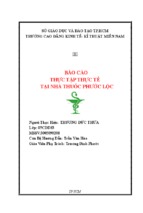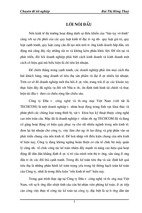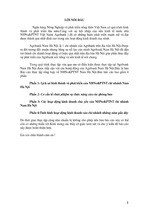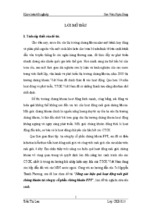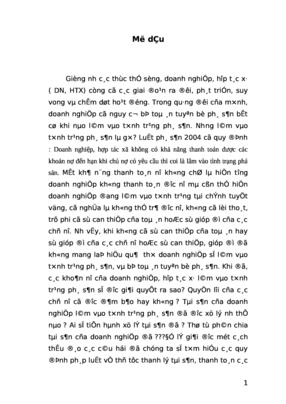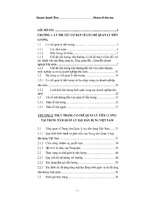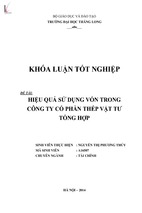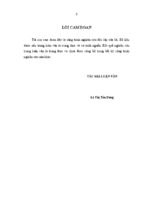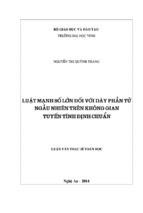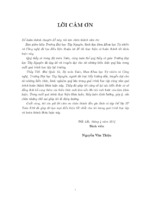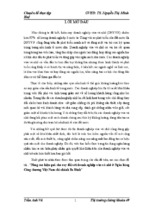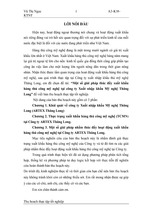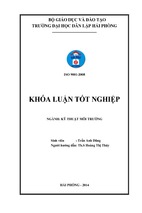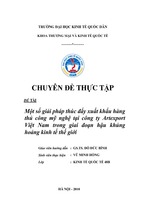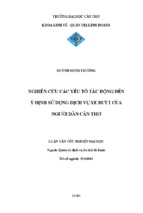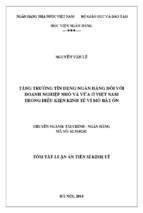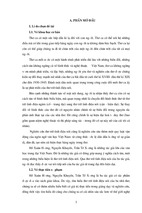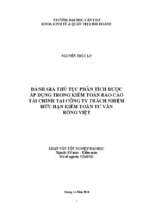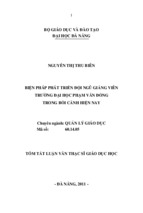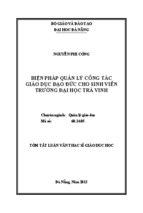1
MINISTRY OF EDUCATION AND TRAINING
UNIVERSITY OF DA NANG
NGUYỄN THỊ LỆ HẰNG
NEGATIVE LANGUAGE TRANSFER
AT DISCOURSE LEVEL: A STUDY OF COHERENCE
IN ESSAYS WRITTEN BY THE THIRD - YEAR
ENGLISH MAJORS AT QUANG BINH UNIVERSITY
Field : English Linguistics
Code : 60.22.15
M.A. THESIS IN THE ENGLISH LANGUAGE
(A SUMMARY)
Supervisor: LÊ PHẠM HOÀI HƯƠNG, Ph.D.
DANANG, 2011
2
The study has been completed at
the College of Foreign Languages, University of Danang
Supervisor: Lê Phạm Hoài Hương, Ph.D.
Examiner 1: Assoc. Prof. Dr. Lưu Quý Khương
Examiner 2: : Assoc. Prof. Dr. Ngô Đình Phương
The thesis was orally defended at the Examining Committee
Time :
April 27, 2011
Venue : University of Danang
The origin of the thesis is accessible for the purpose of reference at:
- The College of Foreign Languages Library, University of Danang
- Information Resources Centre, University of Danang.
3
CHAPTER 1: INTRODUCTION
1.1. Background of the Situation
Writing is an important productive skill in language learning.
It can objectively reflect students’ competence of thinking,
organizing and expressing. In English teaching, writing is considered
as a difficult knot for both teachers and students. Actually, it is
undeniable that English-major students often make a lot of errors in
writing, the higher level of proficiency they are required, the more
errors they make. That is, at sentence level, their difficulties are only
problems related to grammatical structures and vocabulary; or at
paragraph level the problems encountered often relate to ideas
arrangement so as to support the topic sentence. At essay level,
however, the problems are more complicated since they have to deal
with another important feature of academic writing - discourse
organization. A survey of English majors’ writing shows that most of
English majors lose unity and coherence in their writing as their
academic writing practice is oriented more towards accuracy at
sentence level than towards the development of appropriate discourse
organization. Thus, a discourse analysis of coherence in essay
writing can be useful to teachers and students in overcoming problem
stated.
1.2. Statement of the Problem
A number of English majors in Vietnam in general and at
Quangbinh University in particular, at present, cannot write nativelike essays even if they have acquired a large number of vocabulary,
studied a lot about English grammar and essay format. Because of
the strong interference of their mother tongue, students think and
write in a Vietnamese way. This phenomenon is mainly caused by
4
the negative transfer of the mother tongue in English learning. In the
traditional teaching of college English writing, teachers usually focus
on grammar and vocabulary rather than teaching English as a whole.
This results in a problem that students can be completely correct as
sentence level, however, when asked to build paragraphs or essays,
they are not well-done since a good English essay does not only
depend on correct grammatical structures but it is the combination of
grammar and other factors such as unity, cohesion and coherence.
If in sentence writing, grammar and vocabulary are the most
noticeable problem, a lack of clear thesis statement, inadequate
supports or evidences to support and control the thesis statement, a
lack of unity in essay ideas and organization, a lack of coherence
among essay components and so on are major problems confronted
in essay writing. Because of this reason, I decided to conduct the
research entitled “Negative Language Transfer at Discourse Level:
A Study of Coherence in essays written by the third-year English
majors at Quang Binh University” with the aim at responding to the
urgent need for writing quality improvement.
1.3. Justification of the Study
Together with sentence and paragraph, essay writing is an
essential sub-skill that English major students are supported to
develop since this is a way to raise their thinking, reasoning and
expressing their opinions. Essay writing is, moreover, seen as the
highest writing level that English major students are required to
master because its importance to our daily life is undeniable.
The teaching and learning of writing skill at Quangbinh
University, in reality, has achieved, to some extent, great deal of
success. However, it also needed to be improved. This study,
5
therefore, hopes to make a small contribution to the teaching and
learning English writing skill, especially how to help students write
coherent essays so as to create a good foundation for higher levels of
writing.
1.4. Scope of the Study
The study is restricted to investigate negative language
transfer at discourse level, that is, errors appeared when transferring
from L1 to L2 in discourse on the basis of students’ written products,
particularly focusing on the coherence of current English major
students’ essays to clarify how student apply coherence in making
essays logical and understandable to the readers.
1.5. Aims and Objectives
1.5.1. Aims
This study aims at exploring the use of coherence, an aspect
of discourse in English essays written by English majors at Quang
Binh University so as to respond to the urgent need for writing
quality improvement.
1.5.2. Objectives
� Investigate students' perceptions of coherence in essays and the
ways they employ coherence in their essays.
� Identify factors that affect coherence in students' essays in
English.
� Identify likely problems related to coherence faced by students in
the process of essay writing.
� Suggest some implications for teaching and learning essay
writing related to coherence.
1.6. Research questions
1. What are students' perceptions of coherence in essays?
6
2. How do they employ coherence in their essays?
3. What factors that affect coherence of essays are transferred
into students' essays in English?
1.7. Organization of the study
The research includes five chapters: Chapter 1(Introduction),
Chapter 2 (Theoretical Background), Chapter 3 (Methods and
Procedure), Chapter 4 (Discussion and Findings) and Chapter 5
(Conclusions and Implications).
CHAPTER 2: THEORETICAL BACKGROUND
2.1. Overview
2.2. Previous Studies
Up to now there have been a lot of books in which language
transfer, is mentioned by well-known scholars such as Corder
(1974), Odlin (1989). The matter of discourse and discourse analysis
are also investigated by Halliday and Hasan (1976), Beaugrande and
Dressler (1981), Brown and Yule (1983), Cook (1989), Bloor (1990),
Mc Carthy (1991), David Nunan (1993), and Widdowson (1994),
etc.
In Vietnam, there are also a lot of linguists having great
contribution to the study of discourse analysis such as Do Huu Chau
(2001) Nguyen Thien Giap (2003), Tran Ngoc Them (1999), Diep
Quang Ban (1998)…
Together with these theoretical studies relating to discourse
and discourse analysis, some practical ones on this topic have been
conducted so far, such as the doctorial dissertation “Phương tiện liên
kết phát ngôn - Đối chiếu ngữ liệu Anh - Việt” by Phan Van Hoa
(1998) and the master thesis “An Analysis of Coherence and
7
Cohesion and Contrastive Analysis of Lexical Cohesive Devices in
English and Vietnamese” by Phuong To Tam (2003).
Although several studies which analyze cohesion and coherence
have been carried out, there is no evidence that any researchers have
conducted a study relating to coherence in essay writings made by
English major students of a Vietnamese University as this study aims
to explore. Therefore, in this dissertation, the matter of coherence in
essay writing is taken into consideration with the aim at helping
English majors create their own writing products coherently; as a
result, improve their academic essay writing
2.2. Theoretical background
2.3.1. Language Transfer
2.3.1.1. Concepts of Language Transfer
Until now, a lot of different concepts about language transfer
has been set, such as Corder (1974), Odlin (1989).
According to Odlin (1989), “Transfer is the influence resulting
from similarities and differences between the target language and
any other language that have been previously and perhaps
imperfectly acquired”.
2.3.1.2 Kinds of Language Transfer
(i) Positive Transfer: refers to the transfer occurring when
both the native language and the target language have the same form.
(Odlin, 1989)
(ii) Negative transfer: Negative transfer is the use of a
negative language pattern or rule which leads to an error or
inappropriate form in the target language. (Odlin, 1989)
2.3.2. Errors
2.3.2.1. Definitions of Error and Error Analysis
8
According to Crystal (1992):
Error is a term used in psycholinguistics referring to mistakes
in spontaneous speaking or writing attributable to a malfunctioning
of the neuromuscular commands from the brain. It is thus distinct
from the traditional notion of error, which was based on the language
user's ability to conform a set of real or imagined standards of
expression.
Whereas, for the error analysis, he defines as follows:
In language teaching and learning, error analysis is technique
for identifying, classifying and systematically interpreting the
mistakes made by someone learning a foreign language, using any of
the principles and procedures provided by linguistics. (p.135)
2.3.2.2. Errors in Writing
Chambers’ (1989) experience in teaching writing to
university students shows that incoherence is a recurring problem in
the students' writing and can be a major obstacle to their success in
writing classes. Unfortunately, unlike grammatical errors which can
be easily corrected, errors in coherence are often more difficult to
handle as they involve a chunk of units, such as a series of sentences
or paragraphs. Because of the difficulties in correcting errors,
students sometimes do not get sufficient insights into their errors,
and teachers find it impractical to correct the whole erroneous
section.
2.3.3. Discourse and text
2.3.2.1. Discourse
a. Definition of Discourse
Brown and Yule (1983) and Cook (1989) say that discourse
is language in use. Widdowson (1994) considers discourse as “a
9
communicative process. Nunan (1993) considers discourse as “a
stretch of language consisting of several sentences which are
perceived as being related in some way. And the sentences are
related not only in terms of the ideas they share but also in terms of
the jobs they perform within the discourse, that is, in terms of their
functions.”
b. Features of Discourse
* Every discourse has a specific target.
* Every discourse must be completed both in form and in
content.
* Every discourse has its unity.
* Language use can be categorized according to register, level
of formality, attitudes of the other participants or to the
communication, relationship between the participants and the
situational context.
2.3.3.2. Text
i. Definitions of text
According to Lindeberg (1985), text is considered as a layer of
words that can be divided into subparagraphs. Halliday (1973) sees
text as a language unit in use. Fergenson (1989) defines text as a
written notice which is complete in content and structure, and the
writer has a certain attitude to that notice. Later, Brown and Yule
(1996) considers text as a “verbal record of communicative act”.
More recently, McCarthy (1991) focuses learners’ attention on
whole, rather than part of text from as early as possible in their
language development. And Nunan (1993) viewed text as a “written
record of a communicative event which conveys a complete
10
message”. In Vietnam, Tran Ngoc Them (1999) states that in
general, text is a system in which sentences are constituents.
ii. Features of text
* Text has the fundamental factor because every text
expresses speakers’ or writers’ intention.
* Every text must possess the content factor.
* Every text must have the cohesive and coherent factor.
* Every text must be quantitative.
* Every text must be in boundary.
2.3.4. Essays
2.3.5. Coherence
2.3.5.1. Concepts of Coherence
In language teaching, coherence is a component of the
writing skill which plays a crucial part in writing quality. Hatch
(1992) said, “Without coherence, a text is not properly a text”.
Although coherence has been accorded the increasing interest by the
teachers and researchers around the world such as Van Dijk (1997),
Enkvist (1990), Witt and Faigley (1981), it is still an illusive
concept. Therefore, it is essential to have a clear understanding of
the concept of coherence.
According to Palmer (1999), coherence refers to the rhetorical
devices, the ways of writing and speaking that bring about order and
unity and emphasis”.
According to John (1986) coherence can be generally viewed
in two aspects: text-based coherence and reader-based coherence.
The notion of coherence in discourse is so important that if
any two utterances or sentences are produced in a sequence, a
semantic relation or logical connection between them will be
11
assumed. A coherent text, therefore, is one where interpreter can
readily reconstruct the speaker’s plan with reasonable certainty, by
inferring the relations among the sentences and their individual
relations to the various sub-goals in the inferred plan for the entire to
be understood at hand.
2.3.5.2. Ways to achieve coherence
To achieve coherence, Oshima and Hogue (2006) suggest
four basic ways as follows:
i, Repetition of Key Nouns
ii, Consistent Pronouns
iii, Transition Signals
iiii, Logical Order
2.3.6. Cooperative Principle
According to Grice (1975), the Cooperative Principle "Make
your conversational contribution such as it is required, at the stage
at which it occurs, by the accepted purpose or direction of the talk
exchange in which you are engaged.”
Getting more specific, Grice proposes four maxims as
follows:
* The Maxim of Quantity
* The Maxim of Quality
* The Maxim of Relation
* The Maxim of Manner
2.3.7. Adapting Grice’s Maxims in the Teaching of Writing
Although writing differs from speaking in channel, and
grammatical and discoursal features, the Cooperative Principle is not
suspended when communicating in writing. If these maxims are
12
flouted, violated or ignored, it is possible for the readers to derive
quite different meanings from what the writers intended to express.
2.3.8. Chapter summary
CHAPTER 3: METHODS AND PROCEDURE
3.1. Research Design
The thesis design is based on the combination of both
qualitative and quantitative approaches.
3.2. Research Methods
In a study, it is possible to use multiple methods so as to obtain
data from different sources simultaneously. Therefore, in order to
reach the goal of the thesis, the combination of quantitative and
qualitative methods is used to carry out our thesis. Besides, in order
to get the exact instances of appropriate and inappropriate instances
of using techniques to achieve coherence in essay writing, statistics
and descriptive method was also used.
3.3. Description of the Samples
To conduct this study, 100 third-year English major students
studying at Quang Binh University were chosen randomly to fulfill
the activities set by the researcher, that is completing the
questionnaires and 10 others participating in the interview.
3.4. Instrumentation
The instrument for the study were 40 essays written by
English majors during the course. In addition, questionnaires and
interviews were used as instruments for this study.
3.5. Data Collection
Data were collected from students’ written products. About
40 essays collected from 40 students in class were initially analyzed.
13
The questionnaires with the total of 14 closed and openended questions written in English with careful and clear instructions
as well as guidance to make sure that the respondents could easily
understand and give appropriate answers to the questions were
carefully prepared and delivered to 100 third year English majors
randomly because the total students of this course is 126. They, then,
were collected one day later; therefore, students had enough time to
think of the questions carefully before giving their answers.
For coherence analysis of essays, 40 essays written by English
majors at Quang Binh University were holistically and analytically
evaluated. The holistic form of evaluation is based on the
researcher’s general evaluation of the students’ writing while the
analytical form of evaluation is grounded on a set of criteria, that is
Grice’s (1975) maxims of relation, quantity, and manner as a
quantifiable, objective measure of text coherence.
3.7. Reliability and Validity
With an attempt to carry out the study as reliable and valid as
possible, a great effort has been made.
Thanks to a little experience in teaching writing for the English
major students at Quang Binh University as well as the friendly
relationship between the teacher and the students, the researcher was
delighted that the interviews and questionnaires be successful as
they were expected. With the careful explanation of the researcher
and the free discussion of the respondents, the research was more
accurate, reliable and objective.
3.8. Chapter summary
14
CHAPTER 4: FINDINGS AND DISCUSSION
4.1. Overview
This chapter presents the findings of this research. Hence,
the results of questionnaires and interview, as well as the students’
written products are used firstly to investigate the perception of
English-major students at Quangbinh University towards coherence
in essay writing. Following this part is the investigation of how
students employed coherence in essay. Some of the major factors
that affect coherence of English essay written by English major
students are the third part to be mentioned. Together with the
analysis based on the real data collected, brief discussion on the
results in the light of the literature review will be presented with the
aim at making the analysis clearer and more comprehensible.
4.2. Students’ perception towards coherence in essay writing
In terms of coherence, a majority of the students think that it
is very important in essay writing. The result is illustrated through
two different sources of data, the major source is from the
questionnaires and the additional one comes from the interview.
Figure 4.1 which shows students’ perception of coherence in essay
writing indicates that most of English majors at Quang Binh
University are aware of the importance of coherence in essay
writing. This is proved by the selection of 93 out of 100
questionnaire-given
respondents,
occupying 93%. This
high
percentage indicated that coherence in essay writing is very
important and can not be ignored in the process of teaching and
learning writing skill.
Despite the fact that coherence is an indispensable element
to make an essay a good piece of writing, only a small number of the
15
respondents (as shown in Figure 4.2), 8 out of 100 questionnairegiven ones (8.0%) affirmed that they always paid their attention to
coherence when they write an essay. Additionally, 19% of the
respondents said that they often thought about this discoursal
element. Nearly a half of the respondents (48.2%) admitted that they
sometimes took their concern to coherence, meanwhile 15% and
11% of the respondents appealed that they rarely and never kept an
eye on coherence when they wrote an essay respectively.
In order to achieve coherence, every text or discourse should
be clear, unified and well-informed. Similarly, in essay writing,
coherence is seen as one of the prime conditions or characteristics
that make sentences and paragraphs connected, relevant and logical.
It, then, can not be denied that coherence plays an important role in
writing. In the reality, a text without any cohesive signals can be
coherent, on the contrary, there may be another with full of cohesive
devices, yet incoherent. Since, together with the contents, coherence
can be regarded as the heart of the text.
In terms of students’ prior criteria in essay writing, the result
collected shows the variety in their priority of the factors. (See
Table 4.1)
The combination of statistics in column of rate 1 and rate 2
showed that content was the most important criterion that made the
essays acceptable and comprehensible to the readers with the choice
of 68 questionnaire-given respondents. Ranking the second was the
organization of the essays, occupying 48 of the total 100
respondents. Among six criteria given, grammatical structures and
coherence ranked the third place with the total of 42 respondents.
The fourth criterion of importance was word choice by the selection
16
of 21 out of 100 students. The least important criterion, according to
the students, was cohesion with only 10 out of 100 participants.
From the interview, it seems to the researcher that students
did not come up with so many obstacles in using cohesive devices,
however, when asked about the cohesive devices they frequently
used in essay writing, the participants’ answers revealed that their
knowledge of cohesive devices just confined to a limited range of
words or phrases such as and, but, however, first, second, firstly,
finally, in conclusion, in summary, etc…
According to Enkvist (1990), the majority of English majors
feel that the only tool they can use in writing English essays is
grammar and this causes them to have difficulty in making their
writing coherent. From this situation, it is important that the students
be taught alternative strategies to improve coherence in their writing.
Focusing on coherence can shift students' attention from sentencelevel grammar to discourse features such as textual structuring and
unity, which are crucial to creating meaning in texts, indeed, helping
students improve the coherence of their writing is a significant aspect
of L2 writing instruction.
When asked why coherence is an important factor in essay
writing, most of the respondents had more than one choices of
answer, even some of them chose four of five out of six items given,
which makes the rate exceed 100%.
As can be seen in the Figure 4.3, 58 out of 100 respondents
showed their awareness of the importance of this “rhetorical device”
(Palmer, 1999) by giving their own ideas that coherence helps the
essays make sense to every reader, 48 and 43 respondents, shared
their opinions that coherence helps connect ideas in an essay and
17
makes the ideas relevant to the thesis statement respectively. In
addition to the explanation to the importance of coherence above, 32
turns of the respondents said that if they followed the ways to
achieve coherence, the ideas in their essays would be presented in a
logical order. Since coherence refers mainly to the ways of
combining or joining ideas to make a piece of writing clear, logical
and smooth rather than the rules of using grammatical structures
vocabulary, it seemed to the researcher that the English major
students at Quang Binh University could distinguish these two
separated categories. It was illustrated by the choice of only 7 out of
100 respondents to the third item given, that is, coherence helps
show the correctness of word choice and grammatical structures. No
questionnaire-given respondents gave their own other opinions about
this question, however, 1 out of 10 interviewed informants shared his
own idea besides what the researcher listed above. He said, “together
with all the explanation given, coherence can also help ideas in an
essay follow in a clear sequence”, and added that “sentences can be
conjoined in some way, but if they are not followed in a clear
sequence, the essay might not be coherent as it is expected”.
4.3. Students’ ways to employ coherence in essay writing
It can be seen from the Figure 4.4 that more than two thirds
of the respondents (77%) reported that always or often made errors
regarding coherence in essay writing. Nearly 15% of them confessed
that they sometimes made this type of errors, 7% of the total
respondents said that they rarely got obstacles in coherence when
writing an essay, and only 1 questionnaire-given respondent
answered that he/she never made any errors on coherent issue.
18
Learning to write is an indispensable part of language
learning and can reinforce language learning. Without learning to do
so, we cannot have affective acquisition of a language. With
awareness of this necessity, writing is receiving more and more
attention in English teaching. However, when asked about the
difficulties commonly faced in the process of writing essays, the
respondents’ responses varied. (See Table 4.2)
Among
the
six
different
difficulties
given
in
the
questionnaire, most of the respondents did not hesitate to choose
more than one for their responses. Lacking of vocabulary and
structures, and the insufficiency of the ideas closely relating to the
given topic are the two most common difficulties faced by the
English majors. That was illustrated by the confession of the total 70
and 58 questionnaire-given respondents respectively. Ranking the
third and the fourth positions are the two items relating to coherence,
i.e. lacking transition signals for connecting ideas and failing to
arrange ideas in English logically. This was shown by the choice of
38 respondents for the third and 33 others for the fourth. Difficulties
rising in writing thesis statements ranks the fifth, and the last
problems is the insufficient time.
The result collected from the interview, once again,
reaffirmed the variety of the difficulties met with by the English
majors at Quang Binh University. When asked “What are the
difficulties you often encounter in the process of writing an essay?”,
all 10 of the interviewees, by one way or another, revealed that 5 out
of 6 difficulties given were the common ones they often encountered,
except for the last item, the time.
19
Students’ ways to achieve coherence in essay writing is one
of the most important issues that the researcher would like to make
clear in this chapter since finding the suitable ways to make the
essays coherent is considered as a difficult strategy for most of the
English majors at Quang Binh University at the moment. (See
Table 4.3)
i. Proper order
As shown in Table 4.3, 91% of the questionnaire-given
respondents chose proper as a common way to achieve coherence in
essay writing. Additionally, all 10 interviewed students shared their
opinions that proper order is one of the most common ways to make
the essay coherent. When the ideas are well-organized, unity and
coherence in an essay will certainly be easy to achieve. Depending
on different types of essay, different types of order are applied so
that the supporting paragraphs are arranged in proper way, such as
chronological order, spatial order and progressive.
ii. Transition words/phrases
Among the 5 different ways suggested, transition words and
phrases seemed to be paid most concerns by the respondents, even
the interviewed ones. According to Johns (1990), transition signals
are words or phrases that act like “bridge” between parts of the
writing. They link sentences and paragraphs together as smoothly as
they can so that there are no abrupt jumps or breaks between ideas.
Since achieving coherence through transitional words and
phrases such as in addition, however, moreover, although, and first/
second/ third… seem to be easy to construct and link sentences as
well as paragraphs, students tend to take advantage of using this
device as a way to make their essay coherent.
20
In short, using transitional words and phrases is one of the
most common ways to link parts of a whole to make a complete
piece of writing, i.e. an essay.
iii. Repetition of key terms
Together with proper order and transition words/phrases,
repetition of key terms is one of the most common ways to achieve
coherence in essay writing. And it is commonly used by English
majors. This is because repeating words is of importance to the sense
of each paragraph’s message and the whole essay’s as well.
Repetition, as mentioned, is an effective technique to create
a logical, clear and coherent discourse/text. The repetition of key
terms in essays helps the readers; firstly, know the topic that the
writer is mentioning. Furthermore, it helps them see the main ideas
and find out important connections to use. This technique also plays
a part in focusing the readers’ attention on the important ideas from
the beginning till the end of the essays. (See Table 4.4)
iv. Consistent Use of Pronouns
Another way to gain coherence in writing is to keep verb
tenses and pronoun number consistent within each paragraphs and
the whole essay as well.
It is obvious that using pronouns as a means to gain
coherence is a quite natural and effective way to connect ideas and in
fact was widely used by English majors. However, when the use of
personal or possessive pronouns are not clear, it might result in the
possibility of misunderstanding by the readers. (See Table 4.5)
v. Using parallel structures
Relatively speaking, parallelism is seen as pairs of sentences
or utterances which have identical or very similar structures. In other
- Xem thêm -

